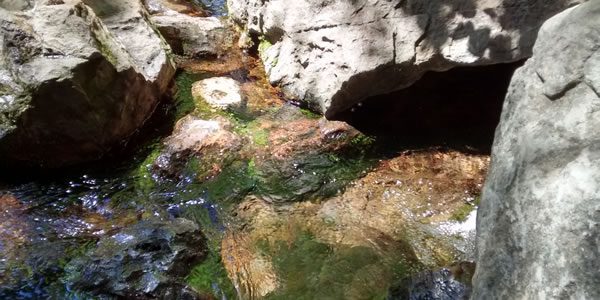Eschatology and the Environment
Or Why Care If It’s All Going To Burn Anyways?
by Annika Mongan, 2002
When I began researching for this paper, I was merely looking for a justification for my concern for the environment, which I believe was placed in me simply by my upbringing in the environmentally concerned culture of Germany. I have been troubled by the degradation of nature, the inhumane treatment of animals in the food industry and in research, and the carelessness and wastefulness of Americans in general and American Evangelicals in particular. The pagan view of the earth seemed promising in providing a motivation for environmental care, whereas the Christian worldview seemed to have neither hope nor concern for nature. Secretary of the Interior, James Watt, seemed to have articulated what I always feared to be true: Christian eschatology’s logical conclusion was not the concern for but the exploitation of nature. Lynn White’s accusations seemed true at least in part: Christianity was to blame for the ecological crisis we find ourselves in today.

My quest began with a search for a biblical apologetic to justify at least some concern for the environment, but to my surprise I found more than an excuse, I found a reason to care for the environment that holds greater promise even than the earth-worshipping paganism I was so attracted to. My learning experience is far from being over, but via this paper I will try to retrace my journey and offer an environmental apologetic that I have come to see as both biblical and compelling.
I have always held to a premillennial view of eschatology with an apocalyptic destruction of the earth. The new heavens and the new earth, I believed, would be brand new creations, nothing of this earth would be left when Christ returns. Like many evangelicals I expected the return of Christ to be soon and thus the earth heading for complete annihilation in the near future. If this indeed is the fate of the earth, it is hard to see why one should care for the environment, polishing brass on a sinking ship. One of the answers I had been given was “but we still have to live here”, a highly anthropocentric view of the environment. As Evangelical Christians we should be careful not to exercise our God-given dominion over the earth to a point where we cut off the branch on which we are sitting. Unfortunately, this view offers little hope, and motivation only for minimal involvement to maintain the status quo.
A slightly more encompassing yet anthropocentric apologetic for environmental care is given by Evangelicals who see environmentalism as a form of social justice. W. Dayton Roberts, a missionary to third-world countries, holds to a premillennial, pessimistic view of the future of this earth. This world will be utterly destroyed, it will wear out like a garment and be replaced by something entirely new. Yet until this apocalyptic devastation takes place, he argues in his book Patching God’s Garment: Environment and Mission in the 21st Century, it is our responsibility as Christians “to patch the garment we must continue to wear as long as we can”, not only for our sake, but for the sake of our fellow human beings (18). Roberts tells story after story of how environmental degradation directly impacts people in third world countries, by causing sickness and poverty, natural disasters resulting in loss of property and lives. In order to stop the devastating effect environmental damages have on people, we must stop the destruction of nature as an act of care for our neighbor. […]
If carelessness with regards to nature leads to social injustice, our present ecological crisis is not merely the result of external factors such as the increase of technology and population growth, but a crisis of morality as well. Van Leeuwen sees greed as the root of the problem. He reasons that “People destroy the earth and do “wrong to a neighbor” because they covet more than the Creator has allotted to them. […] Although social justice is therefore a valid motivation for Christians to show concern for the environment, this view alone is still based upon an anthropocentric understanding of nature. Unfortunately anthropocentrism is not just falsely attributed to Christianity, but advocated by some Christians themselves. An anthropocentric view of the world is held by a number of Christians in America, the most prominent of which are the recently deceased Larry Burkett, Christian economist and financial advisor, and E. Calvin Beisner, Professor of historical theology and social ethics at Knox Theological Seminary (Wright 1). Whereas Burkett’s writings draw primarily on economics and politics in support for his position, Beisner claims to derive his anthropocentric view of the environment from the Bible. He understands the Creation account in Genesis as saying “the earth, with everything in it… was intended by God to serve man’s need. Man was not made for the earth; the earth was made for man” (165). From this belief Beisner deduces that from the perspective of Christianity any concern for the environment must be “for the sake of man, not for its own sake. Anything else is idolatry of nature” (164-165).
It is this anthropocentric understanding of the environment that has lead Lynn White to conclude that “Christianity bears a huge burden of guilt” in the present ecological crisis. Not unlike Beisner’s understanding of the biblical account of creation, White argued in his 1967 article Historical Roots of our Ecological Crisis that Genesis teaches that “no item in the physical creation had any purpose save to serve man’s purposes”. This, according to White, shows that “Christianity is the most anthropocentric religion the world has seen”, hence Christianity holds to the position that “it is God’s will that man exploit nature for his proper ends” (1203-1207).
Both White’s and Beisner’s understanding of Christianity has been critiqued heavily. One of the most common responses to White’s article is the claim that anthropocentrism is not part of a biblical worldview. A recurring assertion at the North American Conference on Christianity and Ecology in August 1987 was that “anthropocentrism is the result of the cult of individualism, which is one of the basic assumptions of modernity…” (Khalil 29). Rev. Wesley Granberg-Michaelson, one of the speakers at said conference, summarizes: “Christian faith in the West has been captive to the assumptions of modern culture … Our problem lies in the church’s historical captivity to Western culture” (22).
Likewise, Christian environmentalist Calvin E. DeWitt attributes any anthropocentric view that endorses greed and exploitation to what he terms “American Folk Religion”, not to be confused with true Christianity. It is the cultural faith in “looking out for number one” which DeWitt claims has been frequently confused with biblical Christianity (Caring for Creation 26-28). Fred VanDyke in Redeeming Creation: The Biblical Basis for Environmental Stewardship laments the confusion of “America’s Number One Religion” with Christianity: “Sadly, much that passes for Christian writing in the present age does not share [a] biblical value system, but is blatantly anthropocentric and idolatrous” (51).

















